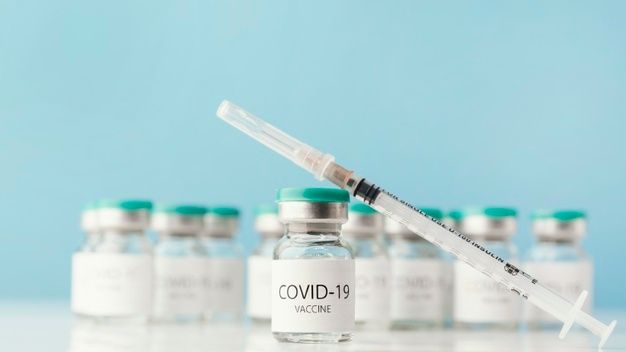
Mix and Match Booster Vaccine Recommendations. What You Should Know
Mix and Match Booster Vaccine Recommendations. What You Should Know
“Mix and match COVID-19 vaccine,” also known as heterologous booster vaccination, means everyone who’s eligible for a booster can either stay with their original brand or opt for a new COVID-19 vaccine if they prefer. A highly anticipated National Institutes of Health study with data on “mixing and matching” COVID-19 vaccines was released on Wednesday (October 13, 2021). Although the study still needs to be peer-reviewed, it found that people who received the Johnson & Johnson vaccine produced stronger antibody levels after they got booster shots made by Moderna or Pfizer compared to boosters from Johnson & Johnson.
The study researchers also found the approach to be safe and effective, although the Moderna and Pfizer-BioNTech vaccines were found to trigger stronger immune system responses than Johnson & Johnson’s vaccine. Also, those who were originally vaccinated with the Pfizer or Moderna vaccines and received either company’s booster shot produced similarly strong immune responses.
Dr. John Beigel, associate director for clinical research in the Division of Microbiology and Infectious Diseases at the National Institute of Allergy and Infectious Diseases, said “It is, I think, a critical piece because it tells you how we can use the vaccines interchangeably and what happens if we do.” He also added that the study wasn’t designed to identify which booster, or which combination of vaccines, is superior. Instead, he believes the study provides evidence that the vaccines and boosters can be safely used in different combinations. “It’s really designed to say: Are there any concerning signals here? And based on the data, I think the answer is no,” said Beigel, who co-authored the study with 36 other doctors and academics.
People who were originally vaccinated with Johnson & Johnson’s single-shot had antibody levels about five times higher after they received matching Johnson & Johnson boosters. Those who originally received Johnson & Johnson’s vaccine but were given boosters of either the Pfizer or Moderna vaccines had significantly stronger immune responses, including antibody levels that were more than 50 times higher after the Moderna booster.
- John Wherry, Director of the Institute for Immunization at the University of Pennsylvania, who was not involved with the research, said the findings suggest that boosters of the Pfizer or Moderna vaccines would be best for people who received the Johnson & Johnson vaccine. But the lower antibody levels measured after the Johnson & Johnson booster do not necessarily equate to worse protection. He added that the most important outcome demonstrated by this research is that it is safe to mix different vaccines and boosters.
The U.S. Food and Drug Administration (FDA) and the Centers for Disease Control and Prevention (CDC) expanded the use of COVID-19 vaccines booster dose in eligible populations and amending the emergency use authorizations (EUA) for COVID-19 vaccines to allow a booster dose as follows:
A single booster dose of the Moderna COVID-19 vaccine may be administered at least six months after completion of the primary series to individuals:
- 65 years of age and older
- 18 through 64 years of age at high risk of severe COVID-19
- 18 through 64 years of age with frequent institutional or occupational exposure to SARS-CoV-2
Also, these recommendations were put forward:
- A single booster dose of the Janssen (Johnson and Johnson) COVID-19 vaccine may be administered at least two months after completion of the single-dose primary regimen to individuals 18 years of age and older.
- Each of the available COVID-19 vaccines may be used as a heterologous (or “mix and match”) booster dose in eligible individuals following completion of primary vaccination with a different available COVID-19 vaccine.
- A single booster dose of the Pfizer-BioNTech COVID-19 vaccine may be administered at least six months after completion of the primary series to individuals 18 through 64 years of age with frequent institutional or occupational exposure to SARS-CoV-2.
What are the Benefits of Mixing Vaccines for a Booster?
Mixing vaccines for a COVID-19 booster may be a great benefit to some people, but it depends on personal circumstances. The CDC is expected to continue to monitor the safety and effectiveness of COVID-19 vaccines to ensure appropriate recommendations to keep all Americans safe and offer more guidance on which vaccines people should choose, including whether it’s best to use their original brand.
Is it Safe to Mix and Match COVID-19 Shots?
Based on the recent National Institutes of Health study, the vaccines and boosters can be safely used in different combinations. Information from outside the United States is also promising, though, as other countries have been officially allowing or recommending people receive two different vaccines, including Germany, Canada, Sweden, France, Spain, and Italy.
Can I Mix and Match the First Two Shots?
No, the CDC’s statement on mixing COVID-19 vaccines only applies to people eligible for a booster dose. As of now, the FDA has only authorized a mixed-series booster, meaning the first coronavirus vaccine series must be one dose of Johnson & Johnson or two doses of Moderna or Pfizer.
Research and materials for this article were compiled, written, and distributed on behalf of the National Public Health Information Coalition. The views and opinions expressed in this blog are those of the various authors and do not necessarily reflect the official policy or position of the National Public Health Information Coalition or its members.
References:
- medrxiv.org/content/10.1101/2021.10.10.21264827v1.full.pdf
- fda.gov/news-events/press-announcements/coronavirus-covid-19-update-fda-takes-additional-actions-use-booster-dose-covid-19-vaccines
- cdc.gov/media/releases/2021/p1021-covid-booster.html
- nytimes.com/2021/06/24/world/europe/covid-vaccine-mix-and-match-pfizer-moderna.html

